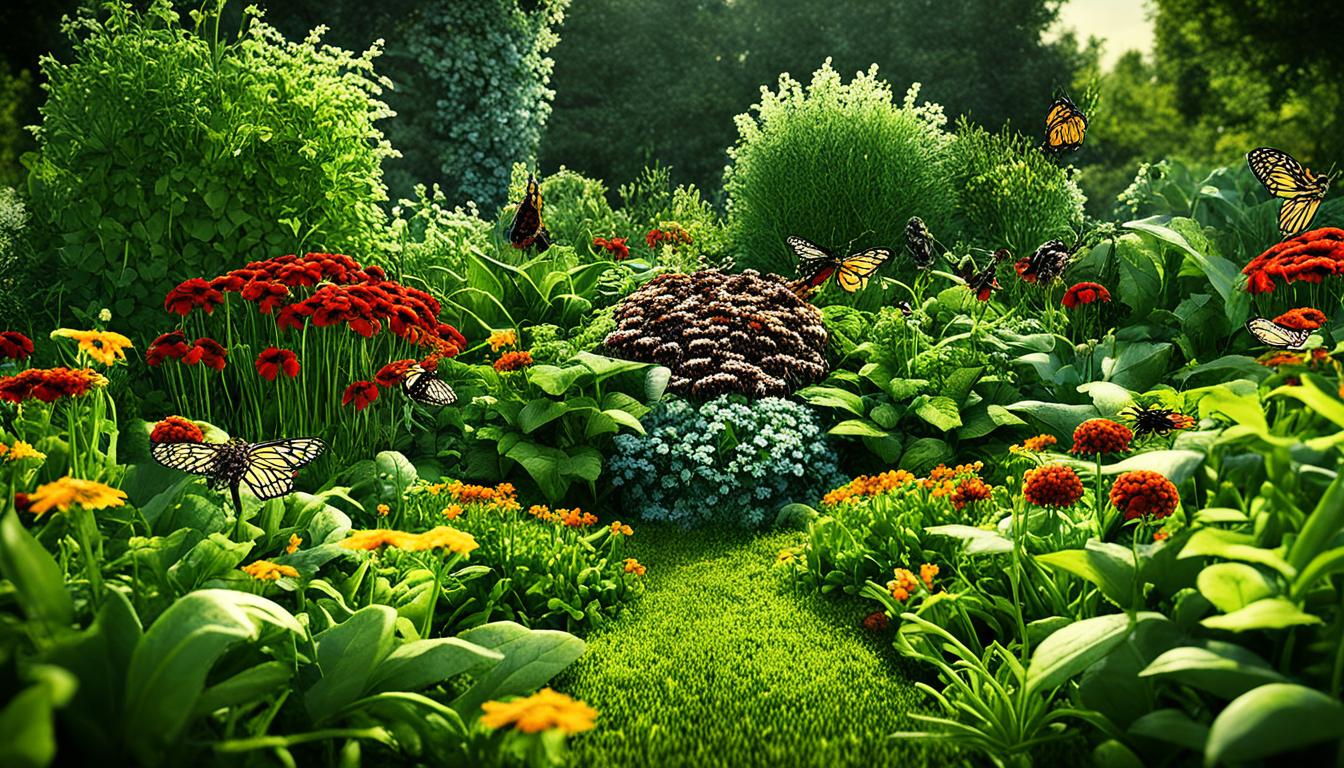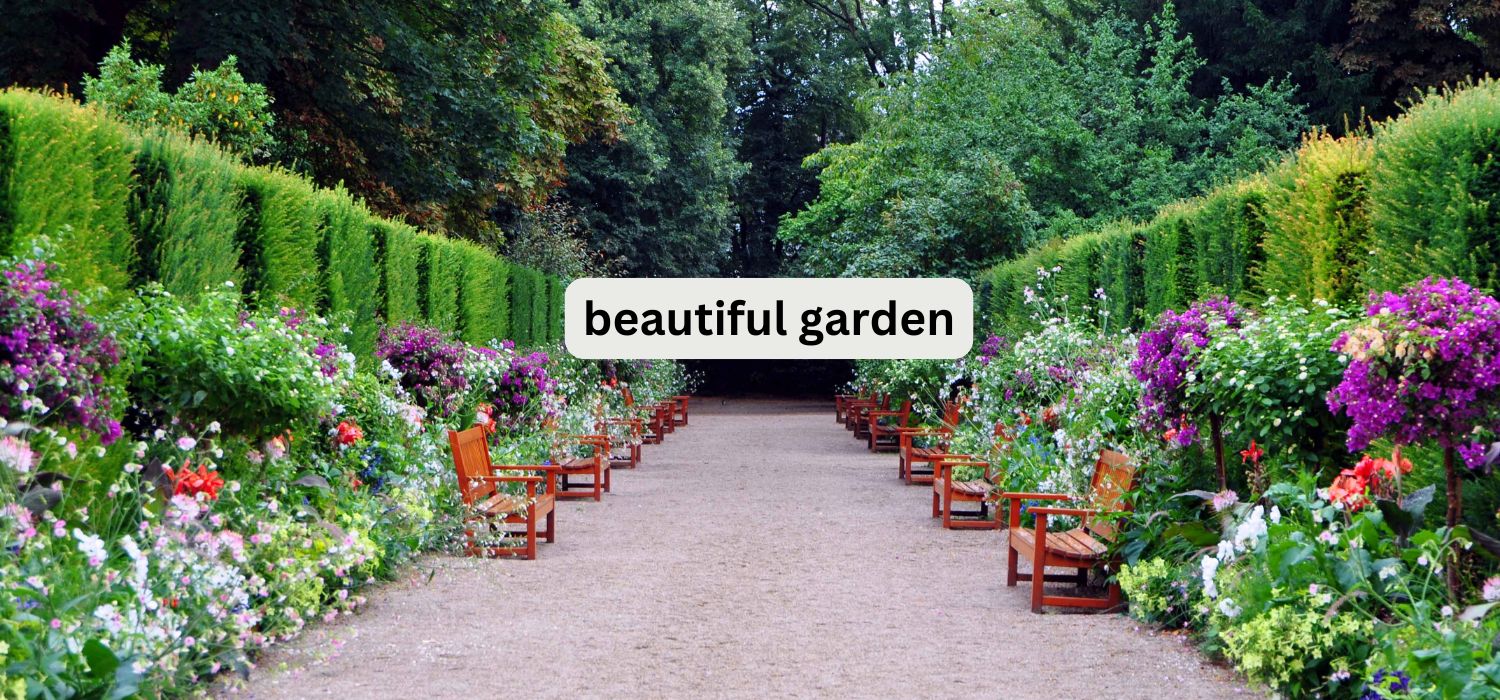More gardeners are turning to sustainable practices, making organic gardening a growing challenge. Dealing with pests, keeping soil fertile, fighting weeds, and getting good crop yields are just a few hurdles. This article will cover these common issues and offer ways to beat them.
One big challenge is pest control. Without synthetic pesticides, you must use natural methods like introducing beneficial insects, planting companions, and using barriers. Knowing how to use nature to fight pests is key to a successful organic garden.
Keeping soil fertile is vital in organic gardening. By composting and adding organic matter, you feed your soil and give your plants what they need. Learning these methods helps you build and keep healthy, rich soil.
Weed control is another big issue in organic gardens. Without chemical herbicides, you must remove weeds by hand, mulch, and use other organic ways. Having a good weed plan is key to keeping your garden balanced and productive.
Getting the crop yields you want in organic gardening can be tough. Using crop rotation and intercropping can help increase your garden’s output. Understanding organic systems helps you aim for big harvests.
There are many challenges in organic gardening, like dealing with disease resistance, getting organic certification, and the hard work it takes. There’s also a lack of research. But with careful planning and flexibility, you can overcome these issues. By facing the unique needs of organic gardening, you can create a garden that’s good for you and the planet.
Pest Control in Organic Gardening
Organic pest control can seem tough, but you can manage pests without harsh chemicals. The key is to work with nature. Use beneficial insects and organic repellents to keep pests away.
Natural Pest Management Techniques
Organic gardeners have many natural ways to control pests. Some top methods include:
- Introducing beneficial insects, such as ladybugs, lacewings, and praying mantis, which prey on common garden pests
- Using organic pest repellents made from natural ingredients like garlic, chili peppers, or essential oils
- Encouraging the presence of insect-eating birds and other wildlife by providing suitable habitats and food sources
- Manually removing and disposing of pest infestations, such as aphids or caterpillars, to prevent them from spreading
Companion Planting for Pest Deterrence
Companion planting is a great way to keep pests away. It means growing certain plants together to block pests. Some plants that help keep pests away include:
- Marigolds, which are known to repel aphids, nematodes, and other soil-borne pests
- Nasturtiums, which can attract and trap aphids, diverting them from your valuable crops
- Basil, which can deterflies, mosquitoes, and aphids from your vegetable plants
Using these natural methods in your garden helps control pests. It also keeps your garden healthy and full of life.
Maintaining Soil Fertility Organically
In organic gardening, keeping the soil fertile is key. Without synthetic fertilizers, gardeners use natural ways to feed the soil. Composting and managing organic matter are crucial for this.
Composting and Organic Matter
Composting changes the game for soil fertility. It turns kitchen scraps, yard waste, and more into a soil booster full of nutrients. This not only cuts down on waste but also helps the soil hold moisture and support good bacteria.
Adding compost to the soil is a big step in keeping it fertile. Compost is full of nutrients, improves soil texture, and helps with water retention. By putting compost on your garden often, you boost the soil’s organic matter levels. This makes a great place for your plants to grow.
| Organic Matter Source | Nutrient Content | Benefits to Soil |
|---|---|---|
| Compost | Nitrogen, Phosphorus, Potassium | Improved soil structure, water retention, and microbial activity |
| Leaf Litter | Carbon, Calcium, Magnesium | Enhanced soil fertility and moisture holding capacity |
| Cover Crops | Nitrogen, Phosphorus, Potassium | Nutrient cycling, soil erosion prevention, and weed suppression |
By using composting and adding organic matter, organic gardeners can make a rich, nutrient-filled environment. This supports the healthy growth of their plants.
Weed Management Without Chemicals
As an organic gardener, managing weeds without chemicals is tough. But, there are many ways to keep your garden weed-free without harming the environment. Let’s look at some top organic weed management tips.
Mulching for Weed Suppression
Using natural mulches is a great way to control weeds. Spread organic stuff like wood chips, straw, or leaves around your plants. This blocks sunlight and stops weed seeds from growing. It also keeps the soil moist and healthy.
Hand-Pulling and Hoeing
Hand-pulling weeds is a good way to get rid of them. Check your garden often and pull weeds before they spread. Hoeing the soil can also stop young weeds from growing.
Cover Cropping and Solarization
Cover crops like clover or rye can beat weeds for nutrients and sunlight. Solarization, covering the soil with clear plastic, kills weed seeds and pests by trapping heat under the plastic.
Using these organic methods, you can keep your garden weed-free without chemicals. Remember, being patient and careful is important for weed management in organic weed control.
Balancing Crop Yields with Organic Methods
Getting high crop yields in organic gardening can be tough without synthetic fertilizers and pesticides. But, gardeners have ways to help plants grow well and be productive. They can do this while keeping their gardens organic.
Crop Rotation and Intercropping
Crop rotation and intercropping are great for boosting crop yields in organic gardens. With crop rotation, different crops follow each other on the same land. This keeps the soil rich in nutrients and stops pests and diseases from spreading. Intercropping means growing two or more crops together. This uses the good relationships between plants to make the garden more productive and healthy.
| Technique | Benefits |
|---|---|
| Crop Rotation |
|
| Intercropping |
|
Using crop rotation and intercropping wisely helps organic gardeners. They can keep the soil healthy and get the best crop yields. All this is done using organic methods, not synthetic products.
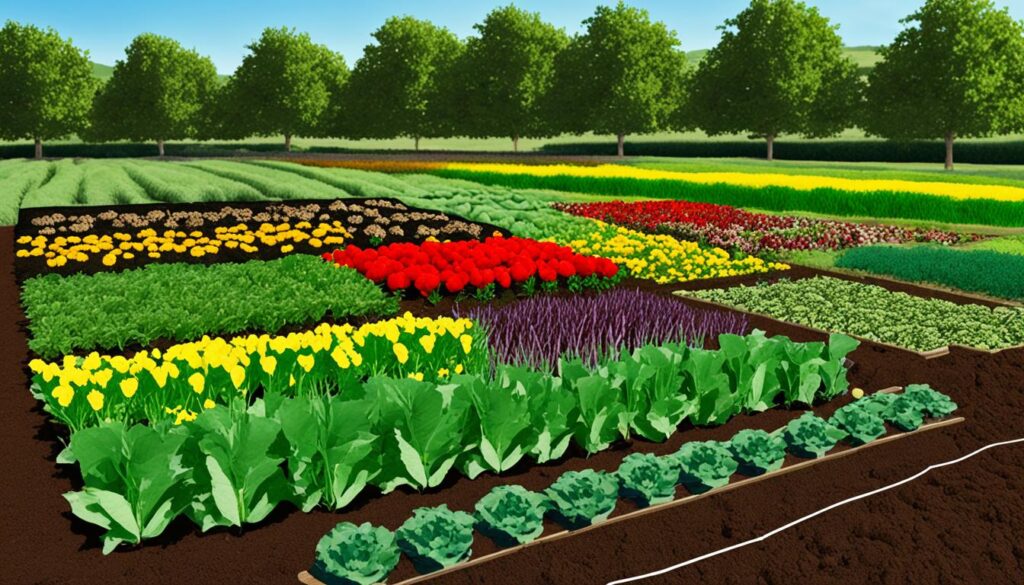
Disease Resistance in Organic Gardens
Keeping an organic garden healthy means fighting plant diseases. Since organic gardeners can’t use chemical fungicides, picking the right plants is key. Choosing plants that naturally fight off diseases helps your garden thrive.
Choosing Disease-Resistant Varieties
When you plan your garden, picking plants that fight off diseases is smart. These plants are made to beat common garden diseases. Adding these tough plants lowers the chance of disease and cuts down on the work needed to keep your garden healthy.
- Look for plant cultivars that are specifically labeled as “disease-resistant” or “disease-tolerant” when selecting seeds or seedlings.
- Research the common diseases affecting the types of plants you wish to grow and choose varieties that are known to have strong resistance to those specific issues.
- Consider heirloom or heritage plant varieties, as they often exhibit enhanced disease resistance compared to modern, commercially-bred cultivars.
| Plant Type | Disease-Resistant Varieties |
|---|---|
| Tomatoes | Cherokee Purple, Brandywine, Sungold |
| Peppers | Ancho Gigante, Bell Boy, Gypsy |
| Cucumbers | Ashley, Calypso, Diva |
Using disease-resistant plants in your garden lowers the risk of big disease problems. This means you can enjoy a healthy harvest every year.
The Challenges of Organic Certification
Getting and keeping organic certification is hard work for gardeners. It involves a lot of rules and paperwork from certifying groups. This can be tough, but it’s key for those wanting to sell their produce as “certified organic.” We’ll look at the challenges of organic certification and how to get past them.
One big challenge is the need for lots of paperwork. Gardeners must keep detailed records of how they grow their plants, what they use, and how they control pests. This can be a lot for beginners in organic gardening.
Another issue is the long time it takes to get certified. It can take years, showing a gardener’s dedication to organic ways. Waiting to sell produce as “certified organic” can be hard.
- Navigating the complex regulations and requirements set by certifying bodies
- Extensive documentation required to demonstrate compliance with organic standards
- The lengthy timeline for obtaining organic certification, often taking several years
- Ongoing inspection and auditing requirements to maintain certification
- Higher costs associated with the certification process
Organic gardeners also face regular checks to keep their certification. This makes sure they keep up with organic methods. But, it takes a lot of time and effort from the gardener.
There’s also a cost to organic certification. The fees for applying and keeping up with certification can be high. This can be hard for small-scale gardeners to afford, especially at the start.
Even with these challenges, organic certification has big rewards for those who care about sustainable gardening. Getting past the hurdles and earning the “certified organic” label opens up a market for health-aware consumers looking for clean, pesticide-free food.
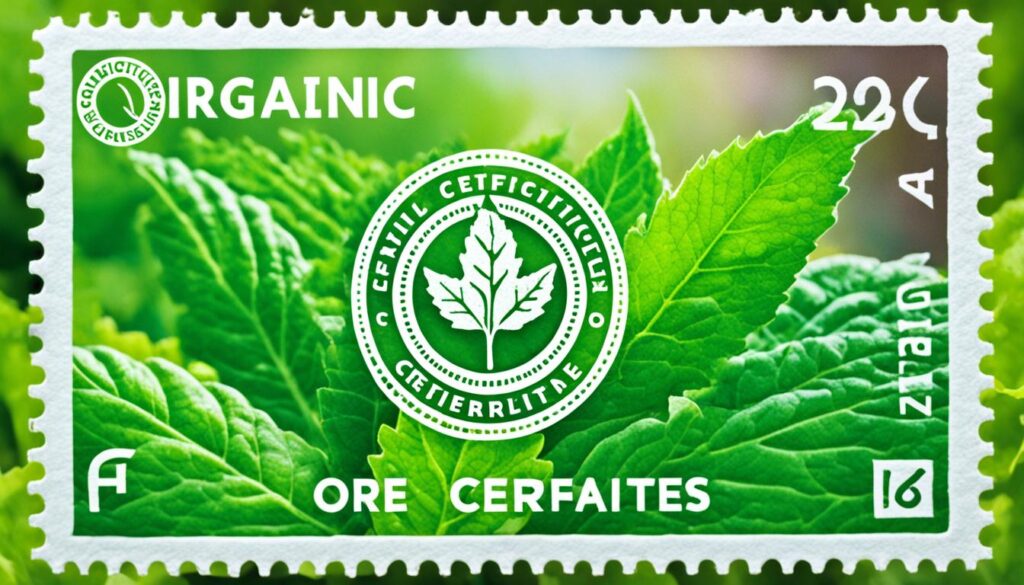
“Obtaining organic certification is a journey, not a destination. The challenges along the way are worth it for those who believe in the power of organic gardening.”
Labor-Intensive Practices in Organic Gardening
Organic gardening takes more effort than traditional gardening. It’s rewarding to grow your own food, but it takes time and hard work. You need to know the extra effort needed for a healthy organic garden.
Sustainable Gardening Techniques
Dealing with weeds is a big challenge in organic gardening. Without chemicals, gardeners must pull weeds or use mulch and cover crops. This can be hard work, especially in big gardens.
Watching out for pests and diseases is another big job. Organic gardeners check their plants often and use natural ways to control pests. This careful work keeps the garden healthy.
Adding organic stuff like compost to the soil is also hard work. Gardeners must put in the effort to keep the soil rich. This helps plants grow well and produce more.
- Manual weed removal: Physically pulling weeds or using mulch and cover crops to suppress weed growth
- Pest monitoring and management: Regularly inspecting plants and using natural pest control methods
- Applying organic amendments: Regularly replenishing the soil with compost, manure, or other natural fertilizers
These hard tasks might seem overwhelming, but gardeners can make it easier. Using crop rotation, planting things together, and tools can help. This way, you can keep your garden healthy without working too hard.
“Organic gardening is a labor of love, but the rewards of growing your own fresh, healthy produce are well worth the effort.”
What are some problems with organic gardening
Organic gardening has many benefits like being good for the planet and reducing harm to the environment. But, it also has its own challenges. Knowing these issues can help you overcome them and make your garden successful.
Pest Control
Dealing with pests is a big challenge in organic gardens. Since you can’t use synthetic pesticides, you must use natural ways to control pests. This includes companion planting, using beneficial insects, and removing pests by hand. These methods can be time-consuming and might not work as well as chemical solutions.
Soil Fertility Maintenance
Keeping the soil fertile is key in organic gardening, as synthetic fertilizers aren’t an option. You need to add organic matter to the soil through composting and other natural methods. This can be hard work and takes time to see results.
Weed Management
Weeds are a big problem in organic gardens because you can’t use synthetic herbicides. You’ll need to weed by hand, use mulch, and try other organic methods. These require a lot of effort and attention to keep your garden weed-free.
Crop Yields
Organic gardens might not produce as much as gardens that use synthetic inputs. This could be because of pests, diseases, or not enough nutrients in the soil.
Disease Resistance
Without synthetic chemicals to fight diseases, organic gardeners must use plants that naturally resist diseases. They also need to take steps to prevent diseases, which might not always work as well.
Higher Costs
Organic gardening can cost more than traditional gardening because of the price of organic materials like compost and natural pest control products. This can be hard for gardeners who are watching their budget closely.
Even with these challenges, many gardeners find organic gardening rewarding. By knowing the problems and tackling them, you can have a successful and sustainable organic garden.
Overcoming the Lack of Scientific Research
Organic gardening is getting more popular, but it often has less scientific research than traditional gardening. This doesn’t mean gardeners should give up. By using expert advice, watching their gardens, and connecting with others, gardeners can still make the most of their organic plots.
One way to deal with the lack of research is to learn from experienced organic gardeners and experts. Join gardening clubs, go to workshops, and check out online resources. These can give you tips and insights that aren’t in formal studies.
Also, pay attention to what happens in your garden. Keep track of what works and what doesn’t. This can help you make better choices in the future. It’s a great way to use your own experiences when there’s not much research available.
Lastly, be part of the organic gardening community, both online and in person. Share what you know, ask for advice, and learn from others. Working together can help you stay up-to-date, try new things, and solve problems as they come up.
“The best way to predict the future is to create it.” – Peter Drucker
By being open to trying new things, watching closely, and working together, organic gardeners can beat the lack of research. With time, effort, and a desire to learn, you can succeed in organic gardening, even without a lot of data.
Managing Higher Costs of Organic Gardening
Starting an organic garden is rewarding but can be pricey at first. You’ll need to buy organic soil and sustainable tools. But, with smart planning, you can keep costs down and still enjoy organic gardening.
Cost-Effective Organic Gardening Tips
Here are some tips to help you save money in organic gardening:
- Embrace composting: Making your own compost saves money on fertilizers.
- Save your seeds: Saving seeds from your garden cuts down on seed costs.
- Explore local sources: Buying from local organic suppliers can be cheaper.
- Invest in durable tools: Quality tools may cost more but save money over time.
- Practice crop rotation: This keeps soil healthy and cuts down on organic additives.
- Consider companion planting: This method can help control pests without expensive products.
Using these tips, you can enjoy organic gardening without spending too much.
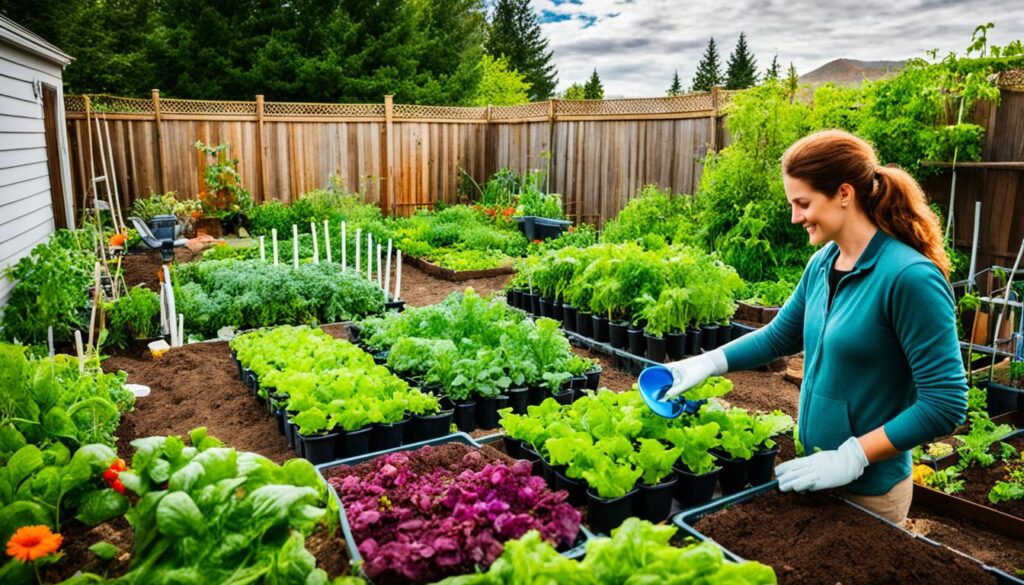
| Organic Gardening Costs | Conventional Gardening Costs |
|---|---|
| Organic amendments (compost, manure, etc.) | Synthetic fertilizers |
| Organic pest control (beneficial insects, natural sprays) | Synthetic pesticides |
| Organic seeds and plants | Hybrid or genetically modified seeds and plants |
| Sustainable gardening tools and equipment | Conventional gardening tools and equipment |
Even though organic gardening costs more upfront, the benefits are worth it. You get better soil, less environmental harm, and tastier food.
Organic Gardening in Urban Areas
Starting an organic garden in the city can be tough, but you can beat the challenges to get fresh, chemical-free food. You might face issues like little space and dirty soil. But, with smart ideas, you can grow your own organic food in the city.
Maximizing Space with Container Gardening
One big problem in cities is not having enough land for gardens. But, container gardening is a great fix. You can use pots, planters, and even old containers to make a garden on your balcony, rooftop, or small patio. This way, you can control the soil and take good care of your plants.
Vertical Gardening: Reaching New Heights
When you’re short on space, vertical gardening can change the game. Use wall planters, trellises, or hanging baskets to grow more plants. You can grow everything from leafy greens to climbing veggies. This method saves space and makes your garden look nice.
Addressing Urban Soil Concerns
City soils can be dirty with things like heavy metals and pollutants. To keep your organic food safe, think about using raised beds or containers with good soil. Test your soil and add things like compost to make it better.
By tackling the challenges of gardening in the city with new ideas, you can enjoy fresh food from your own garden. With creativity and hard work, your city garden can be full of organic food.
| Organic Gardening Technique | Benefits in Urban Areas |
|---|---|
| Container Gardening | Allows for gardening in limited space, provides control over soil quality |
| Vertical Gardening | Maximizes growing area, conserves floor space, adds aesthetic appeal |
| Raised Garden Beds | Addresses concerns with urban soil contamination, improves soil quality |
“Organic gardening in urban areas is not only possible but can be a rewarding and sustainable way to grow your own food. With creativity and a little extra effort, you can transform even the smallest of spaces into a thriving oasis of fresh, chemical-free produce.”
Transitioning to Organic Gardening
Starting with organic gardening can change how you grow your food for the better. It’s a way to make your garden more sustainable and kind to the planet. But, turning an existing garden organic might feel hard. With a well-thought-out organic gardening plan, you can easily add organic ways to your garden. This will help you get lots of fresh produce.
Developing an Organic Gardening Plan
Begin by looking at how you garden now. Check what products and methods you use and see where you can do better. You might want to stop using synthetic fertilizers and pesticides, work on soil health, and grow more different plants.
After figuring out where you are, it’s time to make a detailed organic gardening plan. This plan should cover your big goals and the steps to get there. Think about things like:
- Using organic soil helpers and compost
- Adding good insects and planting them together to keep pests away
- Changing where you plant things and planting them together to keep soil healthy
- Picking plants that fight off diseases
- Using less water with things like mulch and drip irrigation
Transitioning to organic gardening is a process, not just a goal. By going slow and taking steps one at a time, you can make your garden a healthy, lasting place.
“The greatest gift of the garden is the restoration of the five senses.” – Hanna Rion
Common Misconceptions About Organic Gardening
Many gardeners hesitate to try organic gardening because they think it won’t work or is too hard. But, with the right care, organic gardens can be very productive. They don’t need as much work as some people think, thanks to methods like companion planting and cover cropping.
Some think organic gardening costs more. While some organic products might be pricier, you save money over time by not using synthetic fertilizers and pesticides. Plus, making your own compost can cut down on costs.
Some believe organic gardens get more pests and diseases. But, diverse, balanced organic gardens often have natural ways to control pests and diseases. With the right knowledge and methods, you can grow a healthy organic garden.
